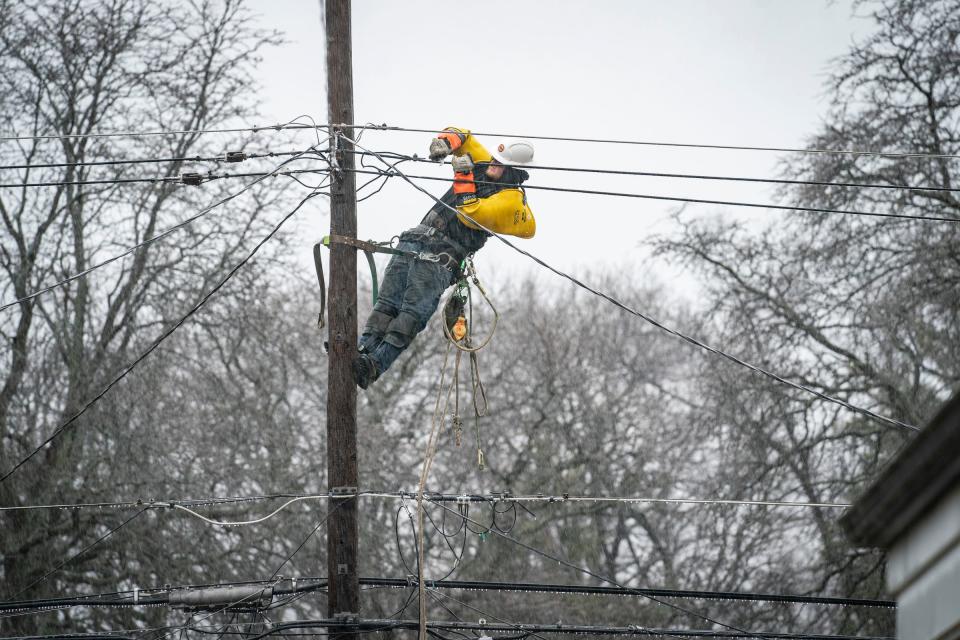DTE and Consumers report lower Q1 earnings, blame storms and reduced electric use
Michigan's two largest energy providers reported earnings for the first quarter of 2023 on Thursday.
Detroit-based DTE Energy Co. reported operating earnings (a measure the utility says provides a meaningful representation of the company’s earnings from ongoing operations) for the first quarter of $274 million, compared with $448 million in the same period last year. That drop in operating earnings is primarily due to higher storm expenses and warmer weather that led to less electric use and so less revenue, among other factors.
Jackson-based CMS Energy, the parent company of Consumers Energy, reported $204 million in net income in the first quarter of 2023, compared with $353 million in the same period in 2022, a decline that is primarily due to similar reasons as DTE.

Here's what we learned as company executives answered questions from analysts Thursday:
1. Historic storms this winter hit utilities hard
Jerry Norcia, president, CEO and chairman of DTE Energy, called the late February ice storm and an early March winter thundersnow that knocked out power to hundreds of thousands of homes and businesses across Michigan "the most challenging two-week storm period we have ever faced as a company."
Norcia said after taxes, the storm cost the utility about $70 million.
Garrick Rochow, president and CEO of CMS Energy and Consumers Energy, said that in the company's more than 100-year history, eight of the most destructive storms have occurred in the last 20 years.
"We saw both unseasonably warm weather in January and February as well as significant costs with the ice storm," he said.
2. They're making cuts and hoping no more big storms come this year
As a result of the financial hit the companies took, they are both cutting costs. Norcia said DTE has reduced its contractor workforce, limited overtime and held off on some of its less time-critical work. Rejji Hayes, executive vice president and chief financial officer of CMS Energy and Consumers Energy, said the company is reducing its costs by limiting hiring and reducing use of consultants and contractors, among other initiatives.
Executives also noted that many of these are one-time actions and won't have an impact on reliability or safety.
The utilities also are hoping for what they call more "normal weather," (fewer severe storms and hot summers) which means customers will use more electricity to cool their homes.
"We came into the year with some challenges," Norcia said. "Through the end of the year, we need normal weather and storms, along with some management actions to offset some of that."
3. They're spending to improve the infrastructure
Norcia said it's important that DTE continues to implement what it learns from the storms. He said the utility will invest $9 billion in the grid over the next five years to further harden the system.
DTE will also continue with tree trimming, preventive maintenance, shoring up existing infrastructure and updating the electric grid. Norcia said the utility also will rebuild the older sections of its infrastructure. In some instances, he said, the company will pursue the undergrounding of its distribution system, a process of burying utility lines underground.
"Lastly, we will accelerate our work to achieve the full automation of the electric grid, which will fundamentally reduce the duration of outages," he said, with the goal of fully automating the grid in five to six years.
Rochow talked specifically about undergrounding and how it could improve reliability. He said Consumers' Midwest peers have about 35%-40% of their lines underground, while Consumers is at 10%. He said the utility is trying to get to the point of moving 400 miles of utility lines underground a year over a 10-year period and go up from there, with the ultimate goal of moving about 10,000 miles underground.
More: DTE and Consumers say they need to raise rates as outages mount
More: DTE, Consumers Energy among worst utilities in US for blackout durations
4. They're encouraged about business growth in Michigan
Norcia said he has seen "some promising ongoing economic development in the state, which will continue to drive growth in our service territory," and pointed to projects like the major expansion to the Henry Ford Hospital campus in Detroit and the Detroit Center for Innovation, a project by developer Stephen Ross to build an academic research center in downtown for the University of Michigan.
Rochow pointed to Ford Motor Co.'s BlueOval Battery Park Michigan in Marshall, which is scheduled to begin initial production in 2026, as "another important win" for the utility.
5. Market reacts positively
Even though the utilities took a hit related to the winter storms, they both reaffirmed their earnings per share guidance for the year.
DTE's stock price rose slightly by 0.5% Thursday and CMS's stock price was up by 1.2%.
"I feel very confident in our ability to deliver and weather whatever Mother Nature throws at us throughout the year," Rochow said.
Contact Adrienne Roberts: amroberts@freepress.com.
This article originally appeared on Detroit Free Press: DTE and Consumers report Q1 2023 earnings: What we learned
